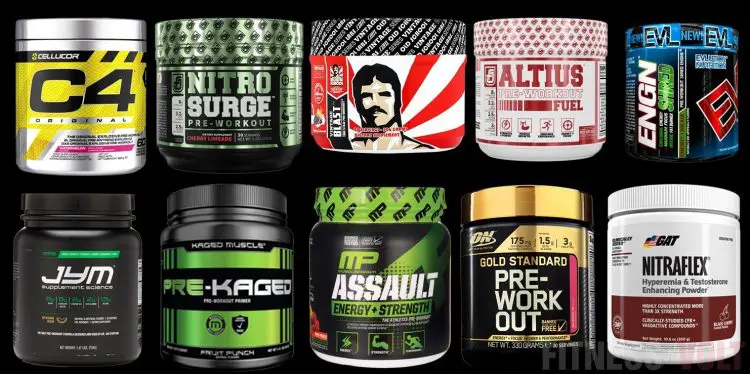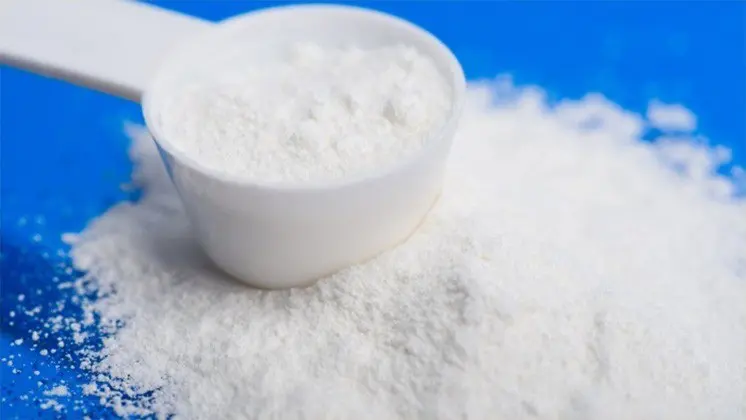Pre-workout supplements are a relatively new invention. Before things like Old School Vintage Blast and Jacked Factory PumpSurge existed, if you needed an energy boost before training, you had a strong coffee and maybe chased it down with a banana or two.
As a young triathlete, my standard pre-workout was a bottle of regular Coca-Cola that was all shook-up, so it was flat and easier to drink.
Nowadays, pre-workouts are a staple supplement for a lot of exercisers, and they’re engineered not just to boost your energy but increase your resistance to fatigue, boost strength and power, make you more focused, and deliver a better pump.
This is not just marketing hype; pre-workouts really do deliver on their promise to boost exercise performance (1).
There are lots of pre-workouts to choose from, and while the ingredient ratios vary from product to product, most contain similar compounds.
In this article, we’re going to take a good, hard look at pre-workouts, their effects, benefits, and potential risks, and answer the question, “how long does pre-workout last?”
What Is A Pre-Workout?
A pre-workout is a supplement designed to be used shortly before training. They have a range of effects, but most people use them so they can exercise harder and longer than usual.
Training harder and longer should make your workouts more productive. However, longer, more intense workouts are a double-edged sword, and you’ll also need to pay more attention to rest and recovery. If you don’t, you run the risk of becoming overtrained. Using a pre-workout should be balanced with a healthy diet and getting sufficient sleep.
The main benefits of using a pre-workout before training are:
- Noticeable increase in energy
- More endurance and less fatigue
- Increased focus, motivation, and aggression
- More reps per set
- A better pump
- Increased strength, power, and endurance
- Faster recovery
Different pre-workout products use different ingredients to boost workout performance, but most are powders designed to be mixed with water and consumed shortly before hitting the gym.
Standard pre-workout ingredients include:
Caffeine

Most pre-workout supplements contain caffeine. The amount can vary from 100mg to 400mg+ per serving. A standard cup of coffee contains about 150mg of caffeine. Caffeine is a powerful energizer that also fights fatigue and increases fat burning. It’s so potent that, up until the 1960s, caffeine was on the Internarial Olympic Committees’ list of banned and controlled substances.
On the downside, a big hit of caffeine can leave you feeling anxious and jittery. Some pre-workouts contain L-theanine, which helps to “smooth” the effect of caffeine, lessening any unwanted side effects.
Some pre-workouts are caffeine-free and designated non-stim (non-stimulating). However, these products are not usually as potent as pre-workouts that contain caffeine.
Creatine
One of the most widely used and well-researched supplements on the planet, creatine has been shown to increase muscle strength, size, and endurance. It may also increase fat burning. The effects of creatine are mostly cumulative, as it takes a while to build up in your body.
That said, even small, irregular doses of creatine may help boost short-term exercise performance. (Find Your Daily Creatine Intake here)
Nitric oxide boosters
Nitric oxide relaxes the smooth muscles of your blood vessels, increasing blood flow. This increases endurance, speeds up recovery, and also improves your pump. Using a pre-workout may make your veins more visible, and now you know why! Nitric oxide boosting ingredients include beetroot extract, L-arginine, and L-citrulline.
Beta-alanine
This is a non-essential amino acid that helps boost endurance and reduce fatigue. This is the ingredient that causes the skin flushing and tingling usually associated with pre-workout use.
Check out the best pre-workout supplements.
When to Take Pre-Workout
Pre-workouts usually kick in quite quickly after taking them. That’s because liquids are digested rapidly, so they enter your bloodstream and start working soon after ingestion.
Most pre-workouts start working within 15-30 minutes. Depending on your sensitivity to the active ingredients, you may feel your pre-workout working sooner or later than this.
Follow the manufacturer’s instructions re. timing your dose of pre-workout, but also be prepared to experiment to determine the best time to take your energizing supplement.
Pre-Workout Side Effects
Pre-workouts have some very noticeable and welcome side effects, including increased energy and less tiredness. However, these supplements can have adverse side effects too. The potential drawbacks of using pre-workout supplements include:
Feeling anxious and jittery
Large doses of caffeine will give you energy but could also make you feel wired. You may feel restless, trembly, or otherwise on edge. This shouldn’t be too much of an issue during your workout but could be a problem if you need to concentrate or relax after your workout.
The good news is that there are plenty of low and non-stim pre-workouts with little or no caffeine. You can also use a half-dose if you are very sensitive to the effects of caffeine.
Red, tingly skin
The vasodilators in pre-workouts increase endurance and pump but can also make your skin flush and tingle. A lot of pre-workout users welcome this effect as it lets them know their supplement is working. However, other people find it uncomfortable and distracting. This effect will dissipate as the pre-workout wears off. It’s also something that becomes less bothersome as you develop a tolerance to the ingredients.
Stomach upsets
Some users experience things like abdominal cramps and diarrhea after using pre-workouts. Rushing to the bathroom mid-set won’t do anything for your training productivity! Avoid this problem by starting with a half-dose and increasing gradually to determine your pre-workout tolerance.
Insomnia
Caffeine is a proven energizer, but it’s also a potent stimulant that could stop you from sleeping. It takes about an hour for your body to metabolize 100mg of caffeine, so you could feel stimulated for several hours after your workout if you use a very high-caffeine pre-workout supplement. Avoid this issue by using a non-stim pre-workout if you train at night.
Headaches
Some people get headaches when they consume too much caffeine. If you drink a lot of coffee, a shot of pre-workout could tip you over the edge and into caffeine overdose territory, triggering a headache. If coffee and caffeine give you headaches, seek out a low-caffeine pre-workout, and limit your caffeine intake for the rest of your day.
Water retention and bloating
Most pre-workouts contain creatine monohydrate. Creatine monohydrate is hydrophilic, which means it attracts water and increases water retention. While creatine can boost strength and endurance, it could make you look a little puffy and bloated with long-term use. This issue tends to affect women more than men. It’s also more noticeable if you are very lean.
Artificial ingredients
Most pre-workouts contain things like sweeteners, colors, flavors, and preservatives, as well as sugar alcohols and other artificial ingredients. Look at the ingredients list; it’ll probably be a long list of chemicals!
Some people prefer to avoid consuming a lot of artificial ingredients and chemicals and may experience unwanted side effects with some colors and sweeteners. Make sure you check the label to see if it contains any ingredients that you know you have a sensitivity to.
How Long Does Pre-Workout Last?
Pre-workouts are designed to help you power through a single workout, and most pre-workouts last for 1-3 hours. The duration depends on the strength and quantity of the active ingredients and your tolerance to them.
Your age, weight, and muscle mass may also affect how long your pre-workout remains active, and you may find that your pre-workout comes on faster and lasts longer if your stomach is empty.
Taking more than a single dose of pre-workout may mean it lasts longer. Some products recommend that you start with a low dose and then gradually increase your intake until you are taking two (or more) servings before your workouts.
If you decide to double dose, make sure you start with a small serving and increase gradually to establish your tolerance.
- Week 1 – ½ serving
- Week 2 – ¾ serving
- Week 3-6 full dose
- Week 7 – 1 ¼ serving
- Week 8 – 1 ½ serving
- Week 9 – 1 ¾ serving
- Week 10 – double dose
Remember that the more pre-workout you take, the greater the unwanted side effects will probably be.
Most pre-workout users begin to develop a tolerance to their chosen product, making its effects less noticeable. Gradually increasing the size of your dose will help preserve the impact of your pre-workout. Still, you may need to switch to a different, more potent formulation to overcome your tolerance.
Are Pre-Workout Supplements Safe for Long-Term Use?
Pre-workout supplements can help you train longer and harder than usual. However, that doesn’t mean they are 100% safe or that you should use them all the time.
For starters, the more often you use a pre-workout, the sooner you’ll develop a tolerance to the ingredients, and the more you’ll need to use to get the boost you want. The more you take, the more unwanted side effects you are likely to experience. Consuming lots of caffeine is not good for things like your heart, blood pressure, and mental state (2).
If you feel like you have to take a pre-workout to exercise, you may have developed a degree of dependency. Also, if you can’t train without pre-workout, it could be that you are following a program that’s too hard for you or that you aren’t paying enough attention to rest and recovery. Most of the time, you should have more than enough energy for your workouts, and low energy could be an indicator that something is wrong.
You’ll get better, more noticeable results from pre-workout if you use it infrequently. That way, you are less likely to develop a tolerance. Try saving your pre-workout for those days when you feel like you really need a boost, like when you are about to attack an especially grueling workout, such as leg day.
Related: How to Make Your Own Pre-Workout Drink
More on Pre-Workouts
If you want to learn more about pre-workout supplements, we have an entire pre-workout section that we recommend you check out!
- How to Make Your Own Pre-Workout Drink
- Best Pre-Workout Supplements
- Best Pre-Workouts Without Creatine
- Best Tasting Pre-Workout Supplements
- Strongest Pre Workout Supplements
- Best Caffeine-Free Pre-Workout Supplements
Wrapping Up
Pre-workouts are beneficial supplements. Loaded with caffeine, creatine, and other energizing and fatigue-fighting ingredients, pre-workouts are like motivation in powder form, allowing you to work out harder and longer than usual.
They can help make up for lack of sleep or simply take your gym performance to a new, higher level.
However, while pre-workouts are mostly safe, they aren’t without side effects. They can cause a range of problems for some users, from anxiety to insomnia to flushed, itchy skin. Side effects depend on your sensitivity to the active ingredients, and some people are more susceptible than others.
You could also develop a pre-workout dependency, and if you train harder than usual but ignore your need for rest and recovery, you could end up suffering from overtraining syndrome, which is when your workouts outpace your ability to recover and adapt.
That said, most people can use pre-workouts safely. Still, it’s generally best to use them infrequently to avoid developing a tolerance and minimize the risk of unwanted side effects. Save your pre-workout for those times you really need it.
References:
1 – Journal of the International Society of Sports Nutrition: The effect of acute pre-workout supplementation on power and strength performance https://jissn.biomedcentral.com/articles/10.1186/s12970-016-0138-7
2 – PubMed: The Safety of Ingested Caffeine: A Comprehensive Review https://pubmed.ncbi.nlm.nih.gov/28603504/
Tip: If you're signed in to Google, tap Follow.














